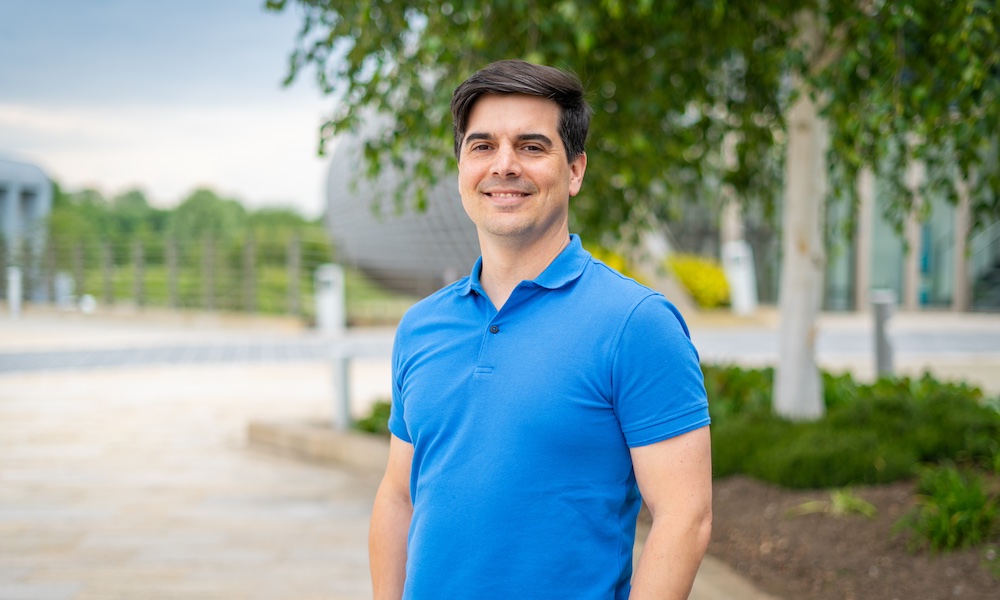
Welcome: David Ocaña
EMBL-EBI’s new Head of Applications will use his expertise in cloud infrastructure and security to support the institute’s open data resources

The EMBL-EBI Applications team plays a vital role in ensuring seamless application deployment and technical infrastructure management to support the institute’s vast array of open access data resources.
As EMBL-EBI’s new Head of Applications, David Ocaña discusses his professional journey, the importance of putting security at the forefront, and how his team is making the most of both public and private cloud to benefit EMBL-EBI’s services and users.
What is your professional background?
I’ve spent most of my career in academia. I’ve had two long-term jobs working in computer science: almost five years at the Barcelona Supercomputing Center (BSC) in Spain and 10 years at EMBL-EBI as part of the Applications team in IT. Prior to this, I studied computer science at the Polytechnic University of Catalonia and did a master’s thesis at Aalto University in Finland, which was a great experience.
When did you first hear about EMBL-EBI and what appealed to you about working here?
I first heard about EMBL-EBI while working on a large collaboration called the Pan-Cancer project between the BSC, EMBL-EBI, and many other institutes. I was impressed by the exciting projects going on across EMBL and the multidisciplinary approach that is embedded in the culture here. When a colleague from my team moved to EMBL-EBI and encouraged me to look for job openings, I decided to pursue the opportunity.
Can you tell us more about what the Applications team does?
The Applications team is responsible for EMBL-EBI’s vast database estate, web application platform, and public cloud activities. As such, it provides a ‘one-stop shop’ for service teams deploying public-facing bioinformatics resources. Examples of some of EMBL-EBI’s web applications include Ensembl, UniProt, Expression Atlas, and many of the other data resources we host.
Our team helps the developers at EMBL-EBI make the process of creating, developing, and deploying these applications as seamless as possible, by helping them decide which infrastructure to use based on their specific needs.
Web applications are great for creating a platform where scientists can access, visualise, and share large datasets around the globe. The work our team is doing directly contributes to making this process easier for our users so they can access the data and tools they need for their research.
Can you give examples of how using the public cloud has benefited EMBL-EBI’s services?
EMBL-EBI has a hybrid cloud strategy which means we use a combination of public cloud services and in-house infrastructure.
The public cloud refers to cloud services provided by third-party vendors, such as Amazon Web Services or Google Cloud. We rent computing resources like storage and processing power on demand. At EMBL-EBI, we use the public cloud for its scalability and flexibility, which helps us meet our large-scale computation and storage needs. It also means that we only pay for what we use, which helps manage costs more effectively compared to maintaining large-scale infrastructure on site.
Using public cloud infrastructure has also provided other teams at EMBL-EBI with more autonomy, allowing them to develop and implement changes faster without depending on the Applications team for every tweak. It has also helped us handle the scale of our operations better, making it easier to manage resources and introduce improvements more efficiently.
We have an in-house cloud platform called Embassy Cloud, over which we have a greater level of control, allowing us to easily provide collaboration spaces not only across EMBL, but also with other research institutions and universities. A hybrid cloud approach also provides us with a more robust recovery solution as we can use the public cloud as a backup when we need it.
What are some of the first things you’re hoping to do in your new role?
The first thing is to ensure EMBL-EBI developers can continue to build cutting-edge applications, by providing access to robust and user-friendly platforms. We want our developers to focus on the application, where we can see their contributions make an impact on the scientific community.
Additionally, I want to focus on bringing security to the forefront. With increasing security threats, it’s crucial that as an organisation we are ready for anything. I also want to make it easier for those creating applications at EMBL-EBI to understand and implement security measures as part of their development and deployment cycles.
Can you tell us about some of your hobbies and interests?
I’m a big fan of racket sports. In Spain, I used to play padel tennis, which wasn’t very well known in the UK when I moved here. I picked up tennis, squash, badminton, table tennis, and even pickleball to fill the gap. It’s been fun exploring different sports, although padel is still my favourite, the good news is that it’s growing faster than ever in the UK over the last few years!
On EMBL’s 50th anniversary year, we’re asking colleagues to share their favourite thing about working at EMBL. What is yours?
I love the diversity and multicultural environment at EMBL. Meeting people from all over the world and collaborating on interesting projects at scale is very fulfilling.


